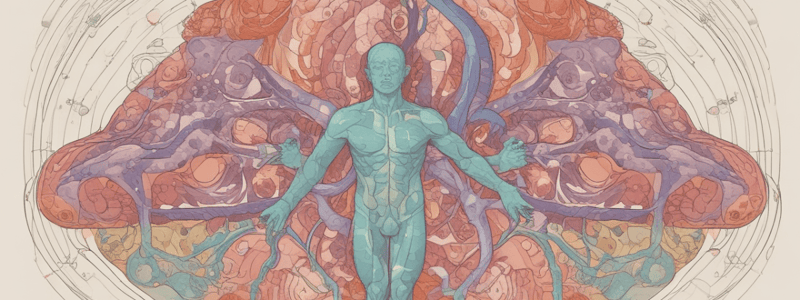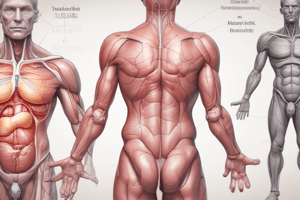Podcast
Questions and Answers
What is the term for an individual's balance of energy expenditure?
What is the term for an individual's balance of energy expenditure?
- set point
- net caloric intake
- circadian rhythm
- metabolic rate (correct)
What happens when fat levels decrease below the body's normal range?
What happens when fat levels decrease below the body's normal range?
- The hypothalamus produces more insulin
- The hypothalamus triggers the proliferation of fat cells
- The hypothalamus slows metabolism (correct)
- The hypothalamus releases growth hormone
When does approximately 50% to 75% of growth hormone production occur?
When does approximately 50% to 75% of growth hormone production occur?
- After the onset of deep sleep (correct)
- When eating
- Prenatally
- During adolescence
What is the primary characteristic of avoidant/restrictive food intake disorders in childhood?
What is the primary characteristic of avoidant/restrictive food intake disorders in childhood?
Which group is more likely to experience failure to thrive?
Which group is more likely to experience failure to thrive?
What is often associated with early onset of feeding disorder?
What is often associated with early onset of feeding disorder?
What has been identified as a specific risk factor for an infant's eating or feeding disorder?
What has been identified as a specific risk factor for an infant's eating or feeding disorder?
What is the diagnosis for a child who eats insects and wood chips?
What is the diagnosis for a child who eats insects and wood chips?
In which group is pica often seen?
In which group is pica often seen?
What characterizes mild binge eating?
What characterizes mild binge eating?
Which eating disorder is most prevalent in the age of abundant fast food and obesity?
Which eating disorder is most prevalent in the age of abundant fast food and obesity?
How do individuals with binge eating disorder (BED) differ from those with bulimia?
How do individuals with binge eating disorder (BED) differ from those with bulimia?
What is the estimated prevalence of anorexia among adolescents?
What is the estimated prevalence of anorexia among adolescents?
What is true about gender differences in relation to eating disorders?
What is true about gender differences in relation to eating disorders?
What is a common outcome for individuals with anorexia?
What is a common outcome for individuals with anorexia?
When does the onset of bulimia typically occur?
When does the onset of bulimia typically occur?
What is a difference between binge eating disorder and anorexia?
What is a difference between binge eating disorder and anorexia?
Which eating disorder is more likely to result in death from starvation?
Which eating disorder is more likely to result in death from starvation?
What is the reason behind pica in the first and second years of life among normally developing infants and toddlers?
What is the reason behind pica in the first and second years of life among normally developing infants and toddlers?
At what stage does a child typically start teething?
At what stage does a child typically start teething?
What is failure to thrive characterized by?
What is failure to thrive characterized by?
What characteristic is often found in mothers of infants with failure to thrive?
What characteristic is often found in mothers of infants with failure to thrive?
What is not affected by failure to thrive?
What is not affected by failure to thrive?
What is obesity?
What is obesity?
Above what percentile is obesity usually defined in terms of body mass index?
Above what percentile is obesity usually defined in terms of body mass index?
Approximately what percentage of American children are obese?
Approximately what percentage of American children are obese?
What is strongly related to obesity in later childhood?
What is strongly related to obesity in later childhood?
At what stage of life can eating disorders occur?
At what stage of life can eating disorders occur?
What percentage of patients with bulimia show full recovery over several years?
What percentage of patients with bulimia show full recovery over several years?
What is a predictor of full recovery for individuals with bulimia?
What is a predictor of full recovery for individuals with bulimia?
Which neurotransmitter is most focused on as a possible cause of eating disorders?
Which neurotransmitter is most focused on as a possible cause of eating disorders?
What condition do people with eating disorders show biochemical similarities with?
What condition do people with eating disorders show biochemical similarities with?
Which factor has been linked to the development of eating disorders?
Which factor has been linked to the development of eating disorders?
Which group appears to be at greater risk for behavioral symptoms of eating disorders?
Which group appears to be at greater risk for behavioral symptoms of eating disorders?
What is true about eating disorders across cultures?
What is true about eating disorders across cultures?
What is a perpetuating factor of eating disorders?
What is a perpetuating factor of eating disorders?
What is the primary focus of the treatment plan for a 12-month-old infant diagnosed with failure to thrive?
What is the primary focus of the treatment plan for a 12-month-old infant diagnosed with failure to thrive?
What is a characteristic of an individual with anorexia?
What is a characteristic of an individual with anorexia?
What is the primary motivator for dieting and body image concerns among young females?
What is the primary motivator for dieting and body image concerns among young females?
What is the role of parents in the treatment plan for an infant with feeding disorders?
What is the role of parents in the treatment plan for an infant with feeding disorders?
What is a risk associated with infant and early childhood feeding disorders?
What is a risk associated with infant and early childhood feeding disorders?
Why is the mother-child relationship critical in the early stages of attachment?
Why is the mother-child relationship critical in the early stages of attachment?
What is a characteristic of an individual with a distorted body image?
What is a characteristic of an individual with a distorted body image?
What is the primary goal of an individual with anorexia?
What is the primary goal of an individual with anorexia?
What is a common motivator for young females who engage in dieting and body image concerns?
What is a common motivator for young females who engage in dieting and body image concerns?
Flashcards are hidden until you start studying
Study Notes
Energy Balance and Metabolic Rate
- An individual's balance of energy expenditure is referred to as their metabolic rate.
- Metabolic rate affects energy balance, which in turn affects body weight.
Regulation of Food Intake
- The hypothalamus plays a crucial role in regulating food intake and energy balance.
- When fat levels decrease below the body's normal range, the hypothalamus slows metabolism to conserve energy.
Growth Hormone Production
- Approximately 50% to 75% of growth hormone production occurs after the onset of deep sleep.
- Growth hormone is essential for growth and development, particularly during childhood and adolescence.
Eating Disorders in Childhood
- Avoidant/restrictive food intake disorders in childhood are characterized by significant weight loss.
- Failure to thrive is more common among children from disadvantaged environments.
- Early onset of feeding disorders is often associated with inadequate care giving.
- Maternal eating disorders are a specific risk factor for an infant's eating or feeding disorder.
Pica
- Pica is a feeding disorder characterized by eating non-nutritive substances, such as insects, wood chips, or dirt.
- Pica is often seen in individuals with intellectual disability.
- Pica among young children (without intellectual disability) often remits when the child experiences increased stimulation.
Failure to Thrive
- Failure to thrive is characterized by growth and eating problems.
- Mothers of infants with failure to thrive are often more insecurely attached than mothers of infants without failure to thrive.
- Failure to thrive may affect physical growth in childhood, but does not affect future cognitive functioning.
Obesity
- Obesity is a chronic medical condition.
- Obesity is usually defined in terms of a body mass index above the 95th percentile.
- Approximately one in six American children are obese.
- Obesity in infancy is strongly related to obesity in later childhood.
Binge Eating Disorder
- Mild binge eating is characterized by one to three episodes of binge eating per week.
- Binge eating disorder (BED) differs from bulimia in that individuals with BED do not have compensatory behaviors.
- BED has become increasingly widespread during this age of abundant fast food and obesity.
Anorexia and Bulimia
- Anorexia is characterized by a refusal to maintain a minimally normal body weight, an intense fear of gaining weight, and a significant disturbance in the individual's perception of their own size.
- Bulimia typically occurs in mid-adolescence to late adolescence.
- Between 50% and 75% of patients with bulimia show full recovery over several years.
Predictors of Recovery and Biochemical Factors
- Higher social class is a predictor of full recovery for individuals with bulimia.
- The neurotransmitter serotonin has been most focused on as a possible cause of eating disorders.
- Biochemical similarities have been found between people with eating disorders and those with obsessive-compulsive disorder.
Risk Factors for Eating Disorders
- Low socioeconomic status has been linked to the development of eating disorders.
- Homosexual men appear to be at greater risk for behavioral symptoms of eating disorders.
- Bulimia, and not anorexia, is mainly a Western phenomenon.
Perpetuating Factors of Eating Disorders
- Starvation symptoms and reaction from others can perpetuate eating disorders.
- A detailed assessment of feeding behavior and parent-child interactions is critical in treating eating disorders in infants and young children.
Studying That Suits You
Use AI to generate personalized quizzes and flashcards to suit your learning preferences.




